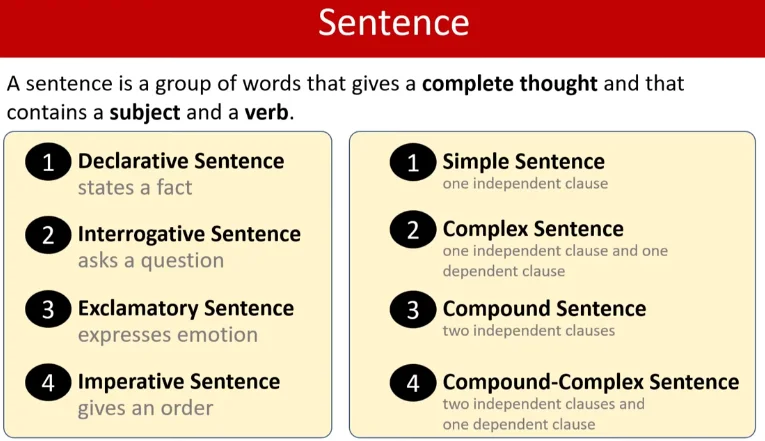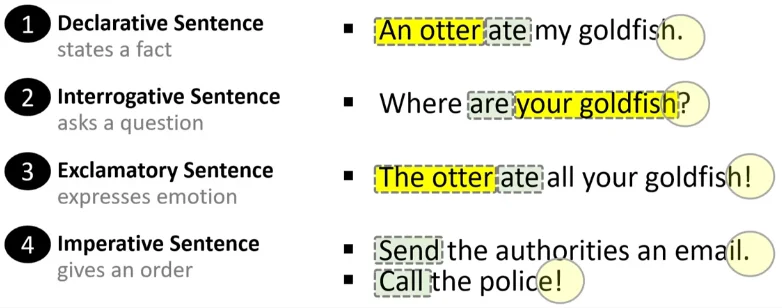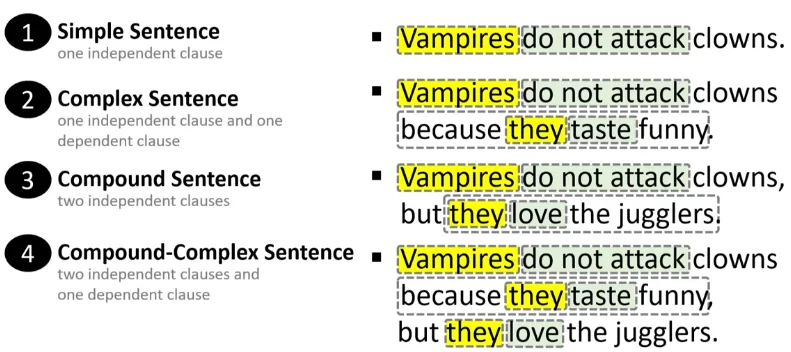A sentence is a group of meaningful words making complete sense and a complete thought. A sentence must have a subject and a verb, and it may also have an object. The subject is the person or thing that is doing the verb, and the object is the person or thing that is receiving the action of the verb. For example:
Examples of Sentences
- Alan is a vampire. 🧛♂️ (Declarative)
- Bind Alan! it’s a vampire. 🧛♂️ (Imperative)
- Is Alan a Vampire? 🧛♂️ (Interrogative)
- Alan is the most dangerous vampire!🧛♂️ (Exclamatory)
In this example, Alan is the subject. This sentence is about Alan.

The subject of a sentence is the doer or what it is about. Because the subject acts according to a verb, verbs express physical actions, mental actions, or states of being. Remember, you cannot have a sentence without a verb.
| No. | Physical Actions | Mental Actions | States of Being |
| 1. | dance | think | Is, am, are |
| 2. | jump | guess | was, were |
| 3. | wash | consider | will, shall |
An otter ate my goldfish.
Well, “an otter” is the subject, and “ate” is the verb, the subject is doing as per the verb and it’s giving a complete thought.
Alan and Jackie met at school.
Alan and Jackie= that’s the subject, notice; in this example, the subject is made up of two people. And, that’s called a compound subject, = “met” is the verb. So. this gives a complete thought and it has a subject and a verb.
Where are your goldfish?
Well, this time the verb comes first, and here’s the subject. This is a complete thought and it has a subject and a verb. The difference this time is that it’s a question. Well, here is the otter is the subject, and ate is the verb.
Send the authorities an email.
only this time we don’t have a subject. But the subject is implied the subject is the word = you So, you send the authorities an email so we have an implied subject. Remember, the subject might be implied.
Four Types of Sentences

A declarative sentence= states a fact OR it declares a fact. For example:
An Otter ate my goldfish.
An interrogative sentence= is a way of saying a question, for example:
Where are your goldfish?
Exclamatory sentence= expresses strong emotion, for example:
The otter ate all your goldfish!
An otter ate my goldfish.
Imperative sentence gives an order, for example:
Send the authorities an email.
Notice, how these sentences end?
- A declarative sentence ends with a full stop or period.
- An Interrogative sentence ends with a question mark.
- An exclamatory sentence ends with an exclamation mark.
- And, an imperative sentence can end with a full stop or a period but it can also end with an exclamation mark if the order is forceful.
Notice, that each one of the sentences gives a complete thought and each one has a subject and a verb.
Clauses in a Sentence
Allen and Jackie met =when they were at school.
The first half of the sentence has a subject and it also has a verb, the second half of it is looking a little bit like a sentence but it does not give a complete thought.
For example: if you said to someone………….. when they were at school…….. they would look at you like you hadn’t finished speaking it does not give a complete thought.
The second half of the sentence is called a clause it’s called a dependent clause. So, when a group of words that contains a subject and a verb does not give a complete thought then it’s a clause called a dependent clause or a subordinate clause.
Now, a group of words that gives a complete thought and that does contain a subject in a verb, is called an independent clause. So, an independent clause is a clause that can stand alone.
Different sentence structures

Simple sentence
A simple sentence is made up of one independent clause. For example:
Vampires do not attack clowns.
(Vampires = that’s the subject, = do not attack, = that’s the verb.)
Complex sentence
A complex sentence is one that has an independent clause and at least one dependent clause. For example:
Vampires do not attack clowns because they taste funny.
There’s our subject in our independent clause, there’s the verb in our independent clause, there’s the subject in our dependent clause, and there’s the verb in our dependent clause. And, = because they taste funny= is our dependent clause. Now, think about this = because they taste funny = cannot stand alone as a sentence, it’s not a complete thought. So, that’s our dependent clause.
Compound sentence
A compound sentence is another structuctre of a sentence that has at least two independent clauses. For example:
Vampires do not attack clowns but they love the jugglers.
There’s the subject in our first independent clause, that’s the verb in our first independent clause. And, love is the verb in our second independent clause they love the jugglers that could stand alone. It is an independent clause, this one has two independent clauses, it is a compound sentence.
Compound complex sentence
A compound-complex sentence is combination of two structures having at least two independent clauses and at least one dependent clause. For example:
Vampires do not attack clowns because they taste funny but they love the jugglers.
There’s the subject in our first independent clause while = because they taste funny = is the dependent clause and then we have= they = that is the subject in our second independent clause and = love is the verb in our second independent clause.
When you join two independent clauses with coordinate conjunction = but = it’s normal to precede the coordinate conjunction with a comma.
=because= This is called subordinate conjunction used to join a dependent clause to an independent clause.
Common Mistakes in a Sentence
You cannot end a sentence with a comma and then write another sentence. However, they are different ways that you can end it with a full stop or a period it was with a question mark or it was with an exclamation mark.
A comma is only an option if you then continue with coordinate conjunction, so this is wrong, this is called a run-on error. And, this is an extremely common mistake.
As soon as you have expressed a complete thought with a clause that contains a subject and a verb. You must put some appropriate end mark to finish your sentence and then you should write another one. So, to correct this finish it appropriately and write another one.
Conclusion
A sentence is a group of words that gives a complete thought and that contains a subject and a verb. Here are the four different types of sentences and here are the four different sentence structures.


It’s very simple and easy to understand even for the beginners
Keep on doing good work
Thanks a lot, Dear Majid sb!